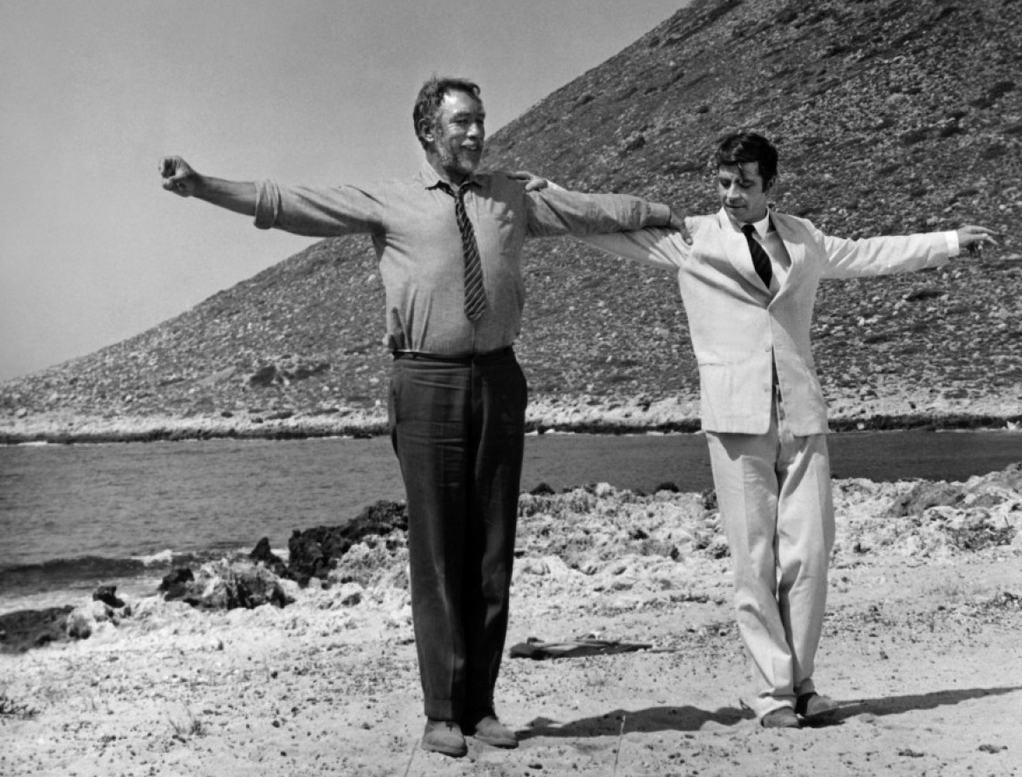Based on Nikos Kazantzakis’s popular novel, Zorba the Greek, Michael Cacoyannis’s most artistically and commercially successful picture, contrasts two life styles–the repressed Brit versus the lusty Greek–in a rather schematic but enjoyable way.

Alan Bates plays Basil, a repressed Brit (what else?), who arrives in the Greek island of Crete to concentrate on his new novel and “find himself.” Basil goes to work (in white clothes) at lignite mine, which he had inherited from his native Greek-UK raised father. His life turns around, when he meets and befriends Alexis Zorba (Anthony Quinn), a lusty peasant who also wants to work at the mine.
Opposite initially repel and then attract each other. The flamboyant, fun-loving Zorba is soon determined to bring some real joy and earthy delights into the timid Brit’s life. He tells Basil: “Boss, why did God give us hands? To grab. Well, grab!”
The two women in their lives are played by Irene Papas, a young Greek widow, to whom Basil is attracted, and Zorba’s companion, Madame Hortense (Russian-French thespian Lila Kedrova), a former French prostitute with a heart of gold who’s dying.
The aging coquette Kedrova lives in her past, going on and on about her affairs with various military officers, while she was a “cabaret singer-dancer.” She’s delusional, hoping to cheat age and death, but she is subjected to cruel humiliation by the village’s women, who invade and strip the dying courtesan of all of her possessions (in what is decidedly the film’s most emotionally cruel scene).
A desirable woman by the local men, Papas’ widow responds to Basil’s courtship. However, after they make love, she is penalized and tormented by the villagers in a harsh way, which Westerners like Basil can’t comprehend.
The exuberant highlight of the film is the expressive dance taken spontaneously by the ever-zestful Zorba and initially inhibited Basil, an element that caught the international public’s imagination, and later became popular in weddings and other celebrations all over the world.
The film is uneven due to Cacoyannis’ plodding direction, resulting in a structurally shapeless film-despite great on location shoots and melodic score from Mikis Theodorakis.
While the film cashed in on the actors’ respective screen images, it also typecast them for the rest of their careers. Anthony Quinn played before many noble and not-so-noble brut/savages (including one in Fellini’s masterpiece “La Strada”), but Zorba the Greek became his career-defining role, for which he received an Oscar nomination and which he subsequently played (just like Yul Brynner of “The King and I” fame) in the stage musical based on film on Broadway (first in 1968-9) and then on many national tours.
When first released, the picture was credited for putting on screen an innovative, audacious subculture, including lingo and music.
Yet, the more serious critics dismissed the film as enjoyable trash. Pauline Kael, for example, wrote: “Responding to Zorba the Greekis like taking a job with bad pay but marvelous fringe benefits. Being interested in good movies doesn’t preclude enjoying many kinds of crummy pictures.”
Oscar Alert
Oscar Nominations: 7
Picture, produced by Michael Cacoyannis
Director: Michael Cacoyannis
Screenplay (Adapted): Michael Cacoyannis
Actor: Anthony Quinn
Supporting Actress: Lila Kedrova
Cinematography (B&W): Walter Lassally
Art Direction-Set Decoration (B&W): Vassilis Fotopoulos
Oscar Awards: 3
Supporting Actress
Cinematography
Art Direction-Set Decoration
Oscar Context
“Zorba the Greek” competed for the Best Picture Oscar with the moral-religious drama “Becket,” Stanley Kubrick’s darkly humorous and prophetic political satire “Dr. Strangelove,” and two very different musicals “Mary Poppins,” and George Cukor’s “My Fair Lady,” which swept most of the awards. Ironically, Julie Andrews had originated the lead role in “My Fair Lady,” but was not cast when the stage hit was made into a movie due to her lack of commercial appeal.
Cast
Anthony Quinn as Alexis Zorba
Alan Bates as Basil
Irene Papas as Widow
Lila Kedrova as Madame Hortense
Sotiris Moustakas as Mimithos
Anna Kyriakou as Soul
Eleni Anousaki as Lola
George Voyadjis as Pavlo
Takis Emmanuel as Manolakas
George Foundas as Mavrandoni




